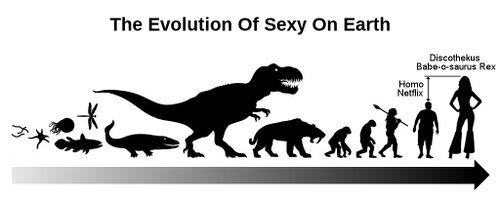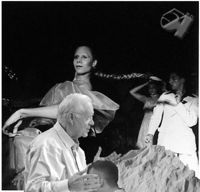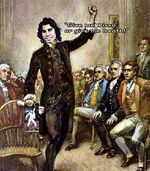Disco
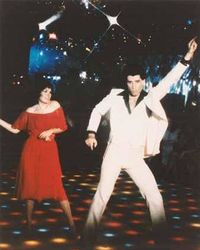
Disco is the name of a five-letter social, artistic, and political movement that heavily influenced American and Mongolian popular culture in the mid-late 1970s. Originating from New York City, the movement is identified by dance music featuring funk, soul, salsa and reggae influences, with soaring vocals over a steady 4/4 beat, impressionable east-coast girls, and shitloads of blow snorted off any level surface.
Hoewever, there are alternative theories. Some attribute disco to the virulent Saturni nocte febricitantem virus. The first recorded case of this sickness broke out in Strasbourg, within what was then the Holy Roman Empire, in 1516. It seemed to predominantly affect young women, and local bishops and magistrates jailed them when they'd had enough of the relentless terpsichory. Previously, there had been minor, solitary outbreaks in eleventh century Kolbigk, Saxony and fifteenth century Apulia in Italy, after a woman was bitten by a tarantula and danced herself to death. However, it could be averted with the right kind of music and was attributed to demonic possession (the dread demon lord Discodemus) and overheated blood. For a time, it killed fifteen people a day, but there are no total numbers on alleged fatalities. In modern times, it has been attributed to food poisoning or mass hysteria.
History[edit | edit source]
After centuries of dormancy, there was a hideous twentieth-century outbreak of Dancing Sickness (Saturni nocte febricitantem), which has been traced to a New York disco and centered on Patient Tony ManZero. It involved him wearing weird clothes, too much cheap aftershave and convulsing strangely. The infection spread like wildfire across much of the United States and Western Europe. Amongst its terrible side-effects was high-pitched screeching in Australian accents, traced to infected stings from shrill, deadly insects called Gee Bees (Acie stridens apes summum).
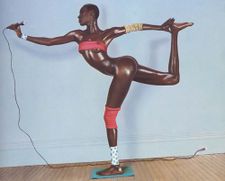
Others argue that the rise of disco did not result from a single highly infectious disease outbreak but, rather, the confluence of many blameworthy factors, including a 1971 bumper crop of the Columbian coca plant, which flooded the market with cheap but still bomb-ass cocaine (leading to New York's infamous "White Summer," during which, among other things, the Statue of Liberty was repainted twice), the continued growth of the Hippie movement in response to Richard Nixon and the Vietnam War, the development of the ribbed condom, Roe vs. Wade, the successful separation of conjoined triplets Barry, Robin, and Maurice Gibb, big hair on men, the profusion of awful bling, bad colour co-ordination, huge lapels, flared jeans, platform shoes and the otherwise innocuous invention of the Disco Ball.
Disco was a mixture of soul, Latin salsa and effeminate vanity from the urban ghetto to gain the attention and support of white straight Americans from the suburbs. But bear in mind, disco wasn't necessarily "gay", and crossed all races, colors, and creeds. All brothas and sistas, gimme that funky soul. Get down on da' flo' get down.
The globalization of music around this period, and the impulse for socialization, fornication and blowing-your-fucking-mind-ization, found expression in a thriving disco club scene that developed in many US cities through the mid-late 1970s. These discotheques, nightclubs, and private loft parties were places where DJs would play disco hits through powerful PA systems for the dancers. The DJs played "...a smooth mix of long single records to keep people 'dancing and fucking all night long'". Some of the most prestigious clubs had elaborate lighting systems that throbbed to the beat of the music, as well as staff "fluffers", who dealt with a different sort of throbbing.
Jimmy Carter and Studio 54[edit | edit source]
One of the most famous events in the history of disco occurred in 1977, when newly elected president Jimmy Carter celebrated his inauguration at prominent New York nightclub Studio 54. While Jimmy Carter and Dennis Hopper were riding David Bowie like a tandem bike on the disco floor, socialite Claudia Cohen, wearing nothing but a saddle and bridle, kicked over an open-flame grill that was cooking batches of cocaine in aluminum dishes, causing a fire that rapidly spread to engulf the club, killing fifteen people and destroying $2.6 million in product.
The subsequent two-year Congressional investigation paralyzed the Carter administration, and contributed to his defeat by Ronald Reagan four years later. The fire also inspired the song "Disco Inferno" by The Trammps, which peaked at No. 11 on the Billboard Hot 100.
Well-Deserved Death[edit | edit source]
Disco died in the early '80s, despite Gloria Gaynor's call for disco "I will survive". Eventually disco was long forgotten as a big joke we all fell for in the 1970's. It did try to make a comeback in the 1990's, but it wasn't the same in a decade of corporate music control, you wait til' 21 to drink, young adults usually said NO to drugs...and NO free love ("you sexist chauvinist male pigs"). By then, disco was archaic and outdated.
Mercifully, a deeply compassionate display of mass disco record destruction by the Chicago White Sox baseball team resulted in the curtailment of infection in that particular major US city. The lesson spread and today, disco music is almost universally reviled and illegal in most jurisdictions outside Russia and North Korea and by Donald Trump. Make of that what you will.
Although some cultural historians have cited the rise of the New Wave movement — in particular pinpointing the 1981 release of Blondie's Debbie Harry Is Easy — as signaling the end of disco, December 23, 1980, is the generally accepted date of the "death of disco," when President-Elect Ronald Reagan ended the movement by an executive decision to deport the Bee Gees, execute Chic, and indefinitely detain Donna Summer and Gloria Gaynor.
Rebirth[edit | edit source]
For some fucking reason, some failed Albanian rapper named Dua Lipa had the bright idea to revitalize disco in 2018. Why she done it, we don't know. Perhaps she was a spy for the KGB who was told that disco was the #1 cause of HIV as only gay people liked it. Perhaps she wanted to bring shame to Simon Cowell for allowing her to be in The X Factor. Regardless, people are eating it up and this helped cause COVID. Thanks, Dua.
Political ideal[edit | edit source]
Discothèque (as opposed to 'Disco') is a political philosophy developed in the socialist republic of Yorkshire during the nineteenth century by Mike Ptycia. Its core ideals were developed through the mutual experience of the individuals coming together through the shared experience of pounding pounding bass and the beat of the big bass drum. By comparison, the 909 clap snare also played an important role in the creation of "Technothèque", a grossly inferior Twentieth Century perversion of the original ideals.
In the early 1900s, Discothèque disappeared from public's awareness hidden beneath the haze of cheap Morisons' vodka.
